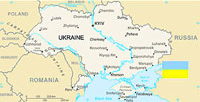Ukraine: Running out of Time

(Business New Europe – bne.eu – Crisis Group – May 15, 2014) Ukraine needs a government of national unity that reaches out to its own people and tackles the country’s long overdue reforms; both Russia and Western powers should back a vision for the country as a bridge between East and West, not a geopolitical battleground.
In its latest report, Ukraine: Running out of Time, the International Crisis Group analyses instability in Ukraine on the eve of the 25 May presidential election and offers recommendations to rebuild and reform the country and reverse the geopolitical stand off it has provoked. The Kyiv government has been unable to assert itself or communicate coherently and appears to have lost control of parts of the country to separatists, emboldened if not backed by Russia. To prevent further escalation, Ukraine needs strong international assistance and the commitment of all sides to a solution through dialogue, not force.
The report’s major findings and recommendations are:
- Although conditions for the election are far from ideal, it must take place as planned and nationwide. The vote is needed to produce a new leader with a popular mandate to steer the country through a process of national reconciliation and economic reform. All presidential candidates should, before the polls, commit to establish a broad-based government of national unity; the new president’s first priority must be to form such a government.
- Ukrainian leaders should reach out immediately to the south and east and explain plans for local self-g overnment and minority rights; they should also declare that they do not desire NATO membership.
- Ukraine’s damage goes far beyond separatism. It is the fruit of decades of mismanagement and corruption across security organs and most other arms of government. Far-reaching reform of the security sector and measures to strengthen the rule of law are crucial.
- Russia should declare unqualified support for Ukraine’s territorial integrity and withdraw all troops from the borders, as well as any paramilitaries who have infiltrated from Crimea or elsewhere. It should persuade Russian speakers in the south and east to end their occupations of government buildings and attacks on local security apparatuses and disband their militias.
- The U.S. and EU need to convey a consistent and measured message, recognising Ð even if not accepting Ð Moscow’s take on the crisis’s origins. This message should comprise political support for Kyiv to conduct elections ; political, financial and expert support for a national unity government to carry out stabilisation measures; measures to make Ukraine viable for investors; further sanctions to bite deeper into Russia’s economy if it does not change course; and quiet high-level talks with Moscow aimed at resolving the crisis.
- Both Moscow and Western powers should emphasise that the present situation can only be resolved by diplomatic means; express support for a post-election government of national unity; take all possible measures to avoid geopolitical confrontation; and insulate other mutual concerns from divisions over Ukraine.
- On the ground in Ukraine today, Russia has immediate advantages of escalation” says Paul Quinn-Judge, Europe and Central Asia Program Director. “Over time, the West likely has the economic and soft-power edge. A successful, democratic Ukraine Ð integrated economically in the West but outside military alliances, and remaining a close cultural, linguistic and trading partner of Russia Ð would benefit all”.
